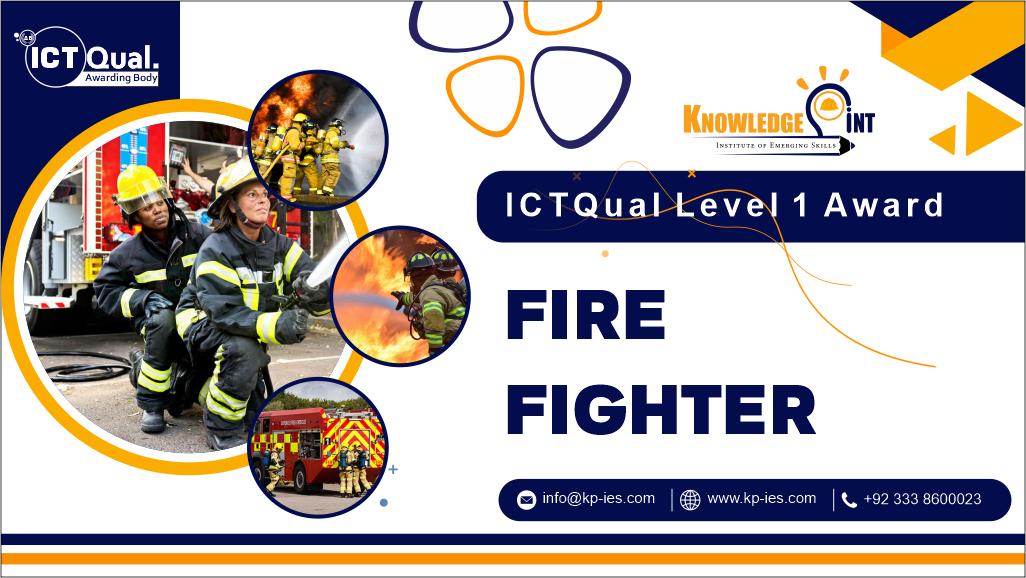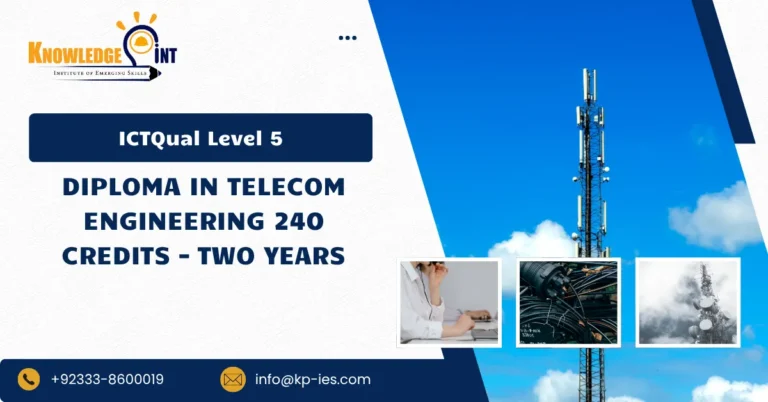Firefighting is a profession that requires courage, quick thinking, and a thorough understanding of safety protocols. It’s a field where every decision can make a difference in saving lives and protecting property. For those looking to take their first step into this challenging yet rewarding career, the ICTQual Level 1 Award in Firefighter offers an essential foundation. This course is designed to introduce newcomers to the fundamentals of firefighting, providing the knowledge and skills needed to start a career in fire and rescue services.
The ICTQual Level 1 Award in Firefighter is an introductory qualification aimed at individuals interested in pursuing a career in firefighting. The course covers a broad range of topics that are essential for understanding the basic principles and practices of fire safety and firefighting. Whether you’re aspiring to become a full-time firefighter or simply want to gain a deeper understanding of fire safety, this course is a valuable starting point.
Upon completing the ICTQual Level 1 Award in Firefighter, participants will have a solid foundation in fire safety and firefighting basics. However, this is just the beginning. The next steps might include pursuing the ICTQual Level 2 Award, which delves deeper into specialized firefighting techniques, or continuing education in related fields such as emergency management, fire investigation, or advanced first aid.
For those committed to becoming professional firefighters, further training at dedicated firefighting academies, apprenticeships, or joining fire and rescue services is often required. These advanced programs provide rigorous physical and technical training, preparing individuals for the demands of the job.
The ICTQual Level 1 Award in Firefighter is an excellent starting point for anyone interested in the firefighting profession. It provides essential knowledge and skills that are not only valuable for aspiring firefighters but also beneficial for anyone looking to enhance their understanding of fire safety. By taking this first step, participants are not only investing in their own career prospects but also in the safety and well-being of their communities. Whether you’re looking to protect your family, support your local fire department, or embark on a new career, this course offers the knowledge and confidence to make a real difference.
Course Overview
The ICTQual Level 1 Award in Fire Fighter consists of 6 mandatory units which are as follows.
The future progression of the ICTQual Level 1 Award in Fire Fighter can lead learners towards several pathways, depending on their career goals and aspirations in the field of law and related sectors. Here are some potential avenues of progression:
Learning Outcomes for Key Units in the ICTQual Level 1 Award in Firefighter
1. Introduction to Firefighting
- Understanding the Firefighting Profession: Explain the roles, responsibilities, and structure of fire and rescue services, including the chain of command and the importance of teamwork.
- History and Evolution of Firefighting: Describe the historical development of firefighting and how modern techniques and equipment have evolved.
- Fundamental Skills and Qualities of a Firefighter: Identify the key skills and personal qualities required for a successful career in firefighting, such as physical fitness, mental resilience, and effective communication.
2. Fire Behavior and Types
- Basic Fire Science: Understand the fire triangle (heat, fuel, oxygen) and the fire tetrahedron, which includes the chemical chain reaction.
- Stages of Fire Development: Describe the stages of fire development (incipient, growth, fully developed, and decay) and how they influence firefighting strategies.
- Types of Fires: Identify different types of fires (Class A, B, C, D, and K) and the specific characteristics and hazards associated with each.
3. Firefighting Equipment and Techniques
- Firefighting Tools and Equipment: Demonstrate knowledge of basic firefighting equipment, including hoses, nozzles, ladders, extinguishers, and breathing apparatus.
- Proper Usage and Maintenance: Explain the correct use and maintenance of firefighting equipment to ensure its reliability and effectiveness.
- Basic Firefighting Techniques: Understand and apply basic firefighting techniques, such as direct and indirect attack methods, ventilation, and fire containment strategies.
4. Safety Protocols and Personal Protective Equipment (PPE)
- Importance of Safety Protocols: Recognize the critical importance of adhering to safety protocols to protect firefighters and the public.
- Types of Personal Protective Equipment (PPE): Identify the different types of PPE used in firefighting, including helmets, gloves, turnout gear, and self-contained breathing apparatus (SCBA).
- Proper Donning and Doffing of PPE: Demonstrate the correct procedures for donning and doffing PPE to ensure maximum protection.
- PPE Maintenance and Inspection: Understand the importance of regular inspection and maintenance of PPE to ensure its effectiveness and safety.
5. Emergency Response and Rescue Operations
- Emergency Response Procedures: Learn the standard procedures for responding to various types of emergencies, including fire, hazardous materials incidents, and medical emergencies.
- Rescue Techniques: Understand and practice basic rescue techniques, such as victim extraction, search and rescue, and first aid.
- Incident Command System (ICS): Familiarize with the Incident Command System (ICS) and its role in coordinating and managing emergency response operations.
- Effective Communication in Emergencies: Emphasize the importance of clear and effective communication during emergency situations to ensure coordination and safety.
6. Legislative and Regulatory Requirements
- Overview of Fire Safety Legislation: Gain an understanding of the key legislation and regulations that govern fire safety and firefighting practices, such as local fire codes and national standards.
- Compliance and Enforcement: Learn the responsibilities of firefighters and fire departments in ensuring compliance with fire safety laws and regulations.
- Legal and Ethical Considerations: Understand the ethical and legal considerations in firefighting, including the duty of care, confidentiality, and the firefighter’s role in public safety education.
These learning outcomes aim to provide a comprehensive foundation for individuals starting their journey in the firefighting profession, equipping them with the essential knowledge and skills to operate safely and effectively in various fire and rescue scenarios.
Course Benefits of the ICTQual Level 1 Award in Fire Fighter :
1. Specialized Expertise
- Auditing Proficiency: Gain specialized knowledge and skills in auditing energy management systems according to the ISO 50001:2018 standard.
- Industry Recognition: Earn a globally recognized qualification that demonstrates your proficiency as an energy management systems auditor.
2. Career Advancement
- Expanded Career Opportunities: Qualify for roles such as Lead Energy Auditor, Energy Management Consultant, or Compliance Officer.
- Higher Earning Potential: Enhance your value to employers and increase your earning potential with specialized expertise in energy management auditing.
3. Industry-Relevant Skills
- Practical Application: Acquire practical skills and techniques for planning, conducting, and documenting energy management system audits.
- Effective Communication: Develop communication skills to interact with auditees, audit teams, and stakeholders effectively.
4. Contribution to Sustainability
- Promotion of Energy Efficiency: Play a key role in promoting energy efficiency and reducing environmental impact within organizations.
- Support for Sustainable Practices: Assist organizations in implementing and maintaining energy management systems that support sustainability goals.
5. Quality Assurance
- Compliance Assurance: Help organizations achieve compliance with ISO 50001:2018 requirements and other relevant regulatory standards.
- Risk Mitigation: Identify areas of non-conformance and provide recommendations for corrective actions to mitigate risks.
6. Continuous Professional Development
- Lifelong Learning: Engage in continuous professional development by staying updated with the latest developments and trends in energy management auditing.
- Networking Opportunities: Connect with industry professionals, auditors, and experts, expanding your professional network and opportunities.
7. Organizational Benefits
- Improved Performance: Contribute to the improvement of organizational energy performance through effective auditing and recommendations for continuous improvement.
- Enhanced Reputation: Help organizations build a positive reputation for their commitment to energy management and sustainability practices.
8. Personal Growth
- Leadership Development: Develop leadership skills to effectively manage audit teams, delegate tasks, and ensure audit objectives are met.
- Confidence Boost: Gain confidence in your abilities as an energy management systems auditor through practical training and hands-on experience.
The ICTQual Level 1 Award in Firefighter provides an excellent starting point for individuals entering the field of firefighting. It lays the groundwork for understanding basic firefighting concepts, safety protocols, and emergency response skills. For those looking to advance their careers or deepen their knowledge, several pathways are available:
1. ICTQual Level 2 Award in Firefighter
Building on the foundation provided by the Level 1 Award, the Level 2 Award delves deeper into specialized areas of firefighting. This course covers:
- Advanced firefighting techniques and equipment usage.
- In-depth study of fire dynamics and behavior under various conditions.
- Specialized training in dealing with hazardous materials (HAZMAT) incidents.
- Leadership and team management skills for supervising firefighting operations.
The Level 2 Award is ideal for those aiming to take on more responsibilities or specialize in certain aspects of firefighting.
2. ICTQual Level 3 Award in Firefighter
For those aspiring to senior roles, the Level 3 Award offers comprehensive training in advanced firefighting strategies and management. Key areas include:
- Incident command and control, including large-scale disaster management.
- Fire investigation techniques and understanding fire cause and origin.
- Advanced emergency medical response skills.
- Public safety education and community outreach.
This qualification prepares individuals for leadership positions within fire services, such as Station Officer or Fire Safety Inspector roles.
3. Specialized Certifications and Courses
Beyond the standard ICTQual progression, there are various specialized certifications available for firefighters looking to enhance their skills in specific areas:
- Urban Search and Rescue (USAR): Focuses on search and rescue operations in urban environments, including collapsed structures and confined spaces.
- Advanced Emergency Medical Technician (EMT): Provides advanced medical training for dealing with a wide range of emergencies.
- Fire Safety Engineering: Offers knowledge in designing and implementing fire safety systems in buildings.
- Wildland Firefighting: Specializes in techniques for fighting fires in forests, grasslands, and other wildland areas.
4. Higher Education and Professional Development
For those interested in a broader scope of knowledge or transitioning into related fields, pursuing higher education degrees such as a Bachelor’s or Master’s in Fire Science, Emergency Management, or Public Safety Administration can be beneficial. These programs offer:
- A deeper understanding of fire science, emergency planning, and risk management.
- Skills in research, policy analysis, and public administration.
- Opportunities to engage in internships or practical experiences in fire services or emergency management agencies.
5. Continuous Professional Development (CPD)
Continuous Professional Development is crucial in the firefighting profession due to the constantly evolving nature of fire hazards and emergency response techniques. Engaging in CPD activities, such as attending workshops, conferences, or seminars, and joining professional associations like the International Association of Fire Chiefs (IAFC) or the National Fire Protection Association (NFPA), can help firefighters stay updated on the latest advancements in the field.
The ICTQual Level 1 Award in Firefighter is just the first step in a potentially long and rewarding career in the fire and emergency services sector. As individuals progress through higher levels of training and gain practical experience, they can specialize in various areas, take on leadership roles, and even contribute to the development of fire safety policies and practices. Continuous learning and professional development are key to staying competent and effective in this challenging and dynamic field.







